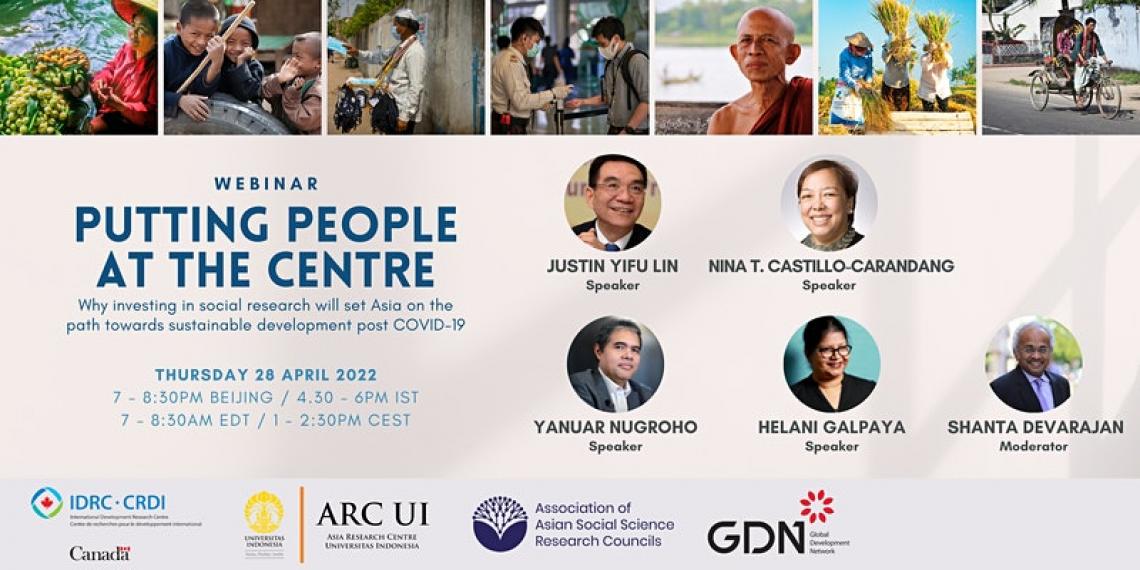Time: 7-8:30am EDT/1-2:30pm CEST/4:30-6 IST/7-8:30pm Beijing time
WEBINAR: REGISTER here.
LISTEN TO A BRAND NEW ASIA RESEARCH NEWS PODCAST ON THE TOPIC HERE
Social scientists across Asia constantly generate knowledge on how we live, make choices, develop shared concerns and decide to act. This knowledge is based on rigorous evidence, vetted and debated across countries and continents. Yet, social sciences often remain on the margin of policy debates and decisions; their evidence undervalued in public deliberations.; and their questions too isolated from the needs of policy.
Social sciences illuminate context, drivers and processes that define change and its impact on Asia’s diverse societies. For example, in the context of COVID-19 responses, it can inform vaccination rollout strategies or examine the reasons for and impacts of population clustering. In the context of climate change adaptation, social science research can evaluate farmers’ willingness to adopt new practices or abandon old ones. And in the context of labour markets, it can explain people’s growing fear of losing jobs to algorithms and automation.
Every policy discussion that does not tap into social research is a missed opportunity to build effective policy on what we know about our past and present, as Asia’s policy community shapes an ambitious vision for the future. And so is every effort at applied social research that does not draw on interactions with policy actors, be they policy makers or civil society actors.
Policy responses to the pandemic could have used more evidence on living conditions of migrants and their needs, or greater insights about social norms and attitudes towards the use of masks or vaccines. Similarly, solutions for the environment, ranging from use of alternative fuel sources, the choice of agricultural technologies, or even potential attitudes towards recycling by urban dwellers, could impact post-pandemic green policies. It is not enough to provide access to technologies without understanding their use for marginalized groups who can seldom participate in public services. In short, social science research can provide an understanding of individual and societal behaviours that can feed into policy-making.
What will enable a closer integration of social scientists in debates on public policies and economic strategies? What levers and formats of collaboration will allow policy to draw on evidence about our societies? What channels and modalities of consultation work better, and what can we learn from the experience of countries in the Asian region to engage better with the next generation of social scientists?
Asia will need to mobilize its universities and think tanks to spark high-quality evidence and debates stemming from social research to feed, inform and guide the socio-ecological, economic, cultural and political transitions ahead. This requires a new alliance with the next generation of Asia’s social scientists. Social research becomes a strategy and a goal for governments as they steer towards a major social transformation of Asian societies.
This seminar brings together different angles from some of the most prominent Asian social scientists, active in academia and policy, to discuss options for strategic investments in an alliance between Asia’s social scientists and the region’s policy infrastructure, with a view to accelerating COVID-19 recovery and a regional transition towards a more sustainable and inclusive region. The panel will explore issues such as:
Can social scientists play a larger role in government task forces and advisory bodies?
What could social scientists contribute to more effective public communication efforts on community health and environmental protection?
What role could governments shape for national research policies and councils in fostering research/policy links on social reforms, climate and environmental transitions, or green economic policies?
How can regional research networks spark public debate and regional integration around common regional policy challenges, in close collaboration with regional governance institutions?
The seminar is a collaboration between the Global Development Network (GDN), the Asia Research Centre (ARC) at the University of Indonesia, the Asian Association of Social Science Research Councils (AASSREC), Canada’s International Development Research Centre (IDRC) and Asia Research News (ARN).
MORE RESOURCES
GDN's work on social sciences and sustainable development in Asia and globally
Report: Social Science and COVID-19 | The Southeast Asia Response
Asia Research News podcast: LINK
Asia Research News article: LINK (p. 6-7)



